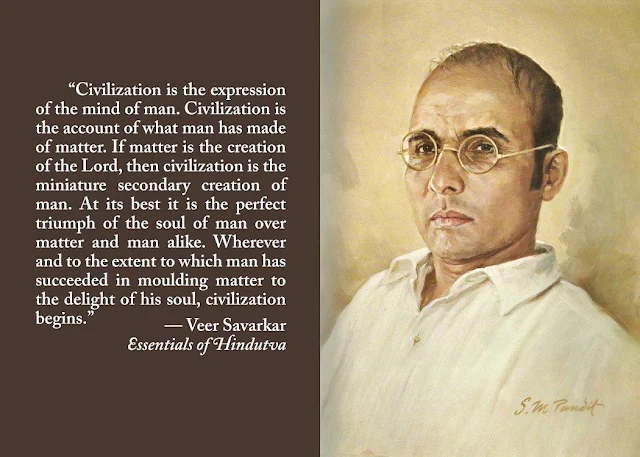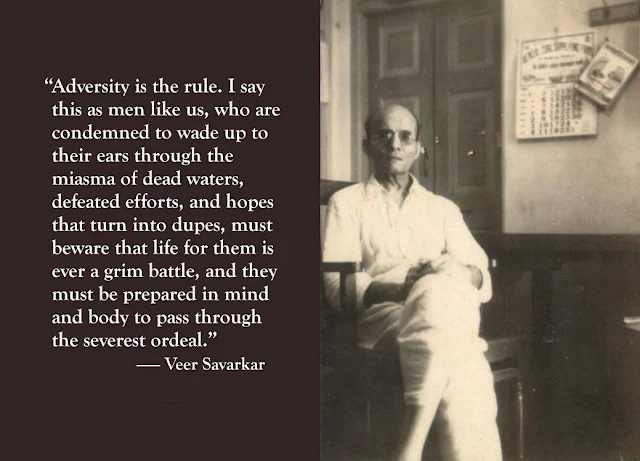The universal deceleration of
Human Rights was adopted by UNGA on 10th December in 1948. As a result of World War II. It was a historic move in redressing the unprecedented war crimes that remained largely under the carpet of power corridors. It not only served as a shield for the war troops but also annexed political prisoners, whistleblowers, diplomats, social activists or any constitutional dispensation who served their purpose in the free world.
Recognising this basic human contention United Nations General Assembly's resolution 217 empowered the civil society at large. This was a defining moment for the human rights activists who floundered to establish new grounds in war-torn areas by attracting the international attention and thus mounting the pressure on countries in international relations with the template of Human rights issues. This is where the united world moved towards a civilised manual of action.
Life of Veer Savarkar
In Kalapani, a cellular jail of Andaman and Nicobar Islands, the political prisoners were tormented with inhuman conditions. The daily task was to extract 30 pounds of oil from mustard seeds and dried coconuts. The failure of completing the task would result in extreme punishment from lodging heavy cross bars in feet to painful bondage. There was no access to outside world but Veer Savarkar spent his time composing poetry, educating prison mates and writing about the conditions meted out to them. Deprived of Pen and paper, Veer Savarkar created his most illustrious literary works in jail by writing on the walls with charcoal, thorns, nails which were later converted into books.
Veer Savarkar was a literary genius who from his childhood days participated in writing petitions, letters, poetry. His magnetism as a leader only rose with time with his social commentaries, translations of books. He learnt Gurumukhi to read Guru Granth Sahib. Being an atheist he expanded his vision on society through philosophies.

There was a time in the national movement of Indian independence when the word political prisoner was a terror to the people, and even neat national leaders uttered his name without using an appropriate appellation due to him as a gentleman as if he was no better than the most condemned miscreant in the society. This heart of repression was bolted in central leadership who sought dominion status when the revolutionaries called for Purna Swaraj (Absolute Independence)
Veer Savarkar received a life sentence of 50 years, which was the harshest in the course of British Colonialism. He was the first revolutionary to embolden the Indian stance of Complete freedom in 1990 and abdicating the use of foreign goods by setting it on fire. Some of the spine-chilling facts about his life include the days where he jumped off a ship to escape the clutches of Imperial forces.
Putting things into perspective.
Indian war of independence 1857 not a First war of Mutiny. When Britan Soldiers trampled down the resistance of the soldiers, they made sure the narrative of revolt was supplanted with the humiliating defeat of the armed Indians. Savarkar aggressively held rallies across various towns and glorified it as India's war of Independence. His book on India's war of independence was proscribed even before it was published and eventually banned in 1909.
This book became a goldmine of revolutionaries, as it explained the revolutions are structured on ideas, not on will or fancies of individuals. Bhagat Singh, inspired by the works of Veer Savarkar, translated this book into Gurmukhi to instil the ideas of revolution in the youth.
Social Reforms
Veer Savarkar was actively a part of social reforms in his public life. He rendered Indians to forfeit their identities united under their original identities of being "Hindu." He coined the term Hindutva to start the uprising of Hindu Nationalism in the subcontinent. He educated masses about social ills of untouchable and caste system. As an atheist, he decried the ritualistic sense of worship.
He invited Dalits to conduct religious ceremonies in temples, unified the fragmented society into a singular identity. He organised Ganesh Utsav festivals where people of all castes could celebrate together. Along with Gandhi, he was His disparity with Gandhi was observed when Gandhi's appeasement touched new heights with Khilafat movement where he alluded Indian Muslims subservience to Khalifa of Turkey as Pan Islamist agenda.
Spark of Indian Revolution
The dynamism of Veer Savarkar was reflected well in writings. Precisely why the revolutionaries of India were intrigued by the fortitude of his ideas with likes of Madan Lal Dhingra, Bhagat Singh, Bhai Parmanand, Lala Har Dayal adopting his ideas into action. This synergy of Veer Savarkar was developed in his teenage years when he used to organise Mitra Mela (Friends fair) to espouse revolutionary and nationalist ideas.
Kanaklata Barua who was killed for chanting Vande Mataram in Quit India movement in 1942, Tirupur Kumaran who was killed for raising a Indian flag in a protest march, Chaplekar Brothers who were hanged in public view for avenging the mass humiliation, Alluri Sita Ram Raju, a folk hero who led guerrilla warfare against British troops, Khudiram Bose a 18 year boy who was executed for his participation in , Peer Ali Khan who was given capital punishment along with 14 other revolutionaries, Birsa Munda the champion of Munda tribe and Indian Tribes who were outrightly criminalised and executed.
The phase of Indian revolution was finding concurrence but somehow down the line, it got disappeared from the books of history and never returned.
Watchword
Life of Veer Savarkar defines that the pen shall always be more powerful than the sword. The arson of Nehruvian determinism that led to discredit the history of Vinayak Damodar Savarkar forsakes the enormous contribution from the revolutionaries of India. If it were up to the counterparts, they would rather have Veer Savarkar shot dead in the remote islands of Andaman than have him exercise the basic human rights. They rebuked his discretion of escaping the claws of Kalapani.
As a highly strategic move, he implored mercy petitions to the British Raj. He was successful in his conviction. He never put down his pen, as went on further to write more books. Living a life too magnanimous for taking on the monumental task of uniting the fragmented society. He met with harsh criticism for his efforts and the air of condescension but proved us the idea of revolution in the real sense which can't be digested.
Even though the history book may not remember the names of our revolutionaries but the ideas of Savarkar will be there as a bedrock in the ideas of revolution and in a construct of any living democracy to highlight the efforts of our people. Veer Savarkar will live on forever in the ideas of Akhand Bharat consolidated against the divisive prompts elicited by malicious means of censorship.





Comments
Post a Comment